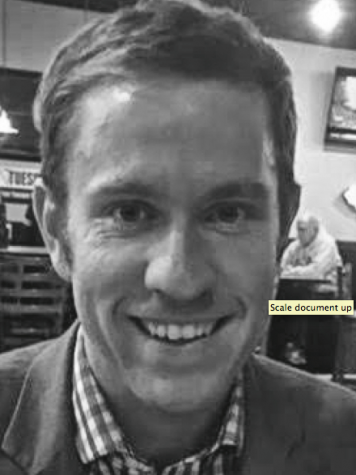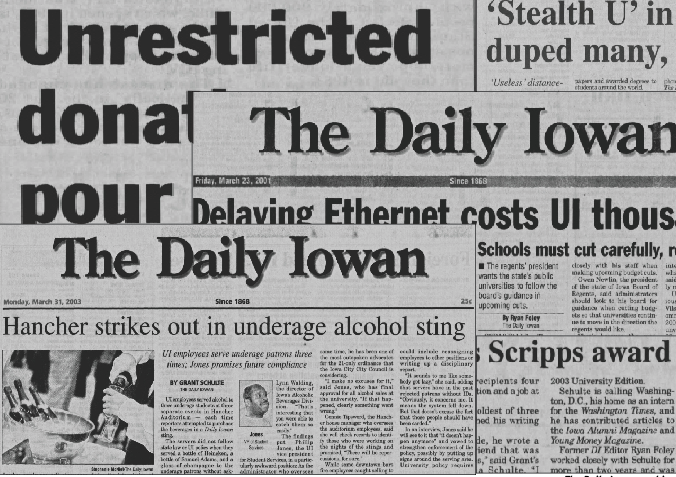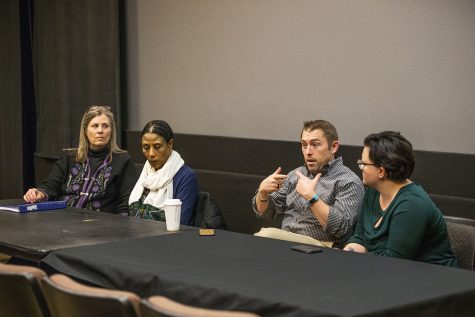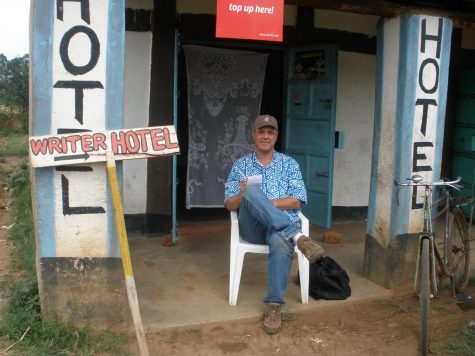AP reporters reflect on their time at the DI
AP reporters Grant Schulte and Ryan Foley both got their start at the DI Metro desk.
November 26, 2018
Associated Press Reporters Ryan Foley and Grant Schulte only spent a couple of years at The Daily Iowan together, but they both made their mark on the publication and went on to make careers doing the same thing: covering state policies and writing national news. Foley is an AP correspondent based in Iowa City, and Schulte is a correspondent in Lincoln, Nebraska.


Working at the DI
Foley joined the DI in 1999 as a Metro reporter, only a couple of years before Schulte. He said the first few weeks on the job were pretty stressful, and he had thought of quitting at the risk of losing his scholarship and facing the wrath of his parents.
“I stuck it out, and I’m really glad I did …” he said. “I loved all four years at the DI, and it’s helped me get a really interesting career.”
Some stories came to Foley during his four years at the DI that many reporters will never get to experience. One of those was 9/11.
RELATED: From the DI sports desk, to international reporting on hunger and malnutrition
“Covering that story and seeing how the DI came together and covered it from so many angles — everyone pitched in for weeks — was amazing,” he said. “That was a really informative, interesting experience.”
He also had the opportunity to expose wrongdoings. When he was Editor-in-Chief, the DI carried out an independent sting operation in which reporters caught Hancher selling alcohol to minors (one of the reporters). The story led to some changes in the university, but it also brought the DI under scrutiny because the newspaper didn’t work with police on the operation.
RELATED: Laughing in the face of ‘Fake News’
Schulte began working at the DI before he even entered college, starting out as a Metro reporter in the summer before his freshman year, in 2001. He started out on the courts beat and ended up writing about a double murder just a few months into the job.
During his five years at the DI, Schulte moved among roles as a reporter, Metro editor, managing editor, and a kind of senior reporter, which hadn’t yet been officially made.
“I was sort of like a senior writer at that point; they didn’t really have that position, but I sort of just made it, because I had enough seniority at that point,” Schulte said.
RELATED: Stories of the world, frame by frame
One of his final stories was a 2,000-word feature about a blind UI student and his life. The story took two months of work, Schulte said, and it ended up gracing the front page. Because the DI is student-run, it had the ability to decide what went up on the front page and what got put on Page 3, which gave the editors more freedom than they might have later in their careers.
“When you’re at the DI, you have more control over the publication than you will at any other stage in your career,” Schulte said.
The path to the AP
“I’ve always been kind of fascinated with the AP,” Foley said.
After his time at the DI ended, Foley took an internship with the Wall Street Journal in Washington, then came back to Iowa to take a temporary position in Des Moines with AP. He worked there for around a year before taking an AP position in Madison, Wisconsin, and stayed there for six years. In 2010, Foley came back to Iowa City and took an AP position here.
“Going back to my time with the DI, it gives me great historical perspective on Iowa news,” he said.
One thing Foley said he’s seen at AP is a shift from writing daily news, like much of the work at the DI, toward longer, more in-depth pieces.
“There’s less of a desire for run-of-the-mill daily stories and more of an emphasis on doing something that’s unique, that’s going to be worthy of a front page and impactful,” he said.
Schulte said he can trace back any job he’s had to the DI and the connections he made there. After his time at the DI, Schulte went to the Des Moines Register after someone at the DI told him about the opening. He stayed until 2011, when he received an email from Foley, his former editor-in-chief, telling him about an AP position in Lincoln, Nebraska. Schulte took it and has worked as a correspondent there since.
“So many opportunities that I’ve had I can attribute back to the people I worked with at the DI,” he said.
When the state Legislature is in session, Schulte covers it and state policies. When the legislative session is over, he writes some longer national stories, such as ones on the Keystone XL Pipeline. Another story he wrote that made national noise was the story of Whiteclay, Nebraska, a tiny town that sells millions of cans of beer to residents of the Pine Ridge Indian Reservation, where alcohol is forbidden.
Both reporters said the DI did a great job of preparing them for the real world of journalism. Learning how to meet deadlines every day and handling the pressure of deciding what should be written about and having people question stories gave them the tools they needed to succeed as career journalists.
Endurance was needed to do all that while also juggling classes, Schulte said, and the opportunities they had to stumble and make mistakes get young journalists ready for what’s to come.
“Going to J-School and working at the DI full-time; it was so stressful, I still have nightmares about it,” Foley said. “So by the time I graduated, I remember going to the AP, and I was like, ‘Are you serious? This is so easy.’ … You’re off at 5 o’clock if there’s no huge news going on, it’s crazy. I was beyond prepared to work in the real world.”





















